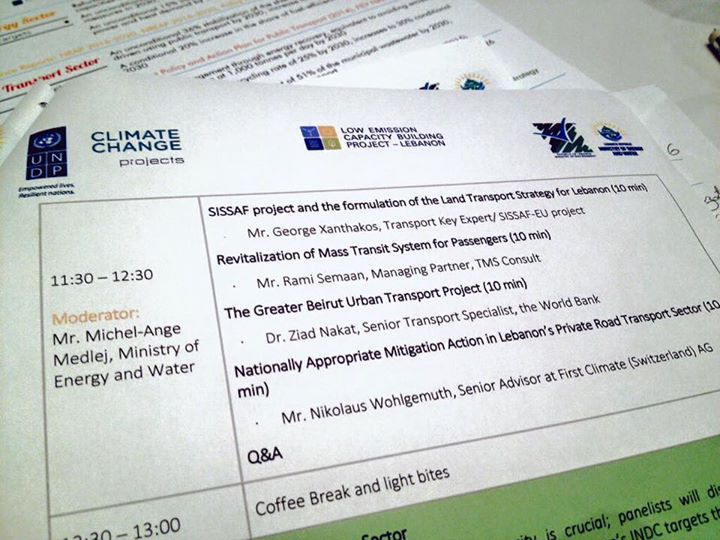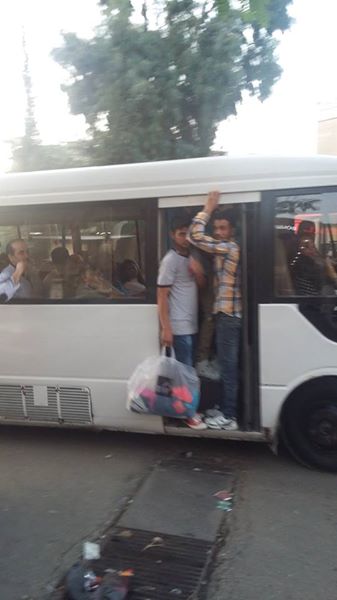Good morning, Beirut! Check out this video to see Bus Map Project co-founder Chadi Faraj speaking with MTV Lebanon about our initiative!
Tag: Lebanon
Taking the Bus to Movenpick: First Meeting of the INDC Working Group in Lebanon

Today’s First Meeting of the INDC Working Group that is following up on Lebanon’s COP21 climate action targets was very informative. It was good to hear updates from Dr Ziad Nakat on the World Bank-led Greater Beirut Urban Transport Project that we keep reading about in the news. From today’s presentation, the project seems to combine the MoPWT-DGLMT’s ‘Pilot Project’ for a comprehensive bus network in Beirut with three BRT ‘backbones’ on the northern, southern and eastern axes.
We would have liked to hear more about how this project will fit into the existing transit system. Indeed, there’s a lot left unsaid when the project is referred to as “the first public transport system in Lebanon” while also saying that there are “important challenges related primarily to arrangements with existing public transport operators.”
We appreciated learning about the EU-funded SISSAF Project, and their work with the MoPWT to develop a Land Transport Strategy. Again, it wasn’t clear how this fits into existing projects, including the GBUTP, but the comprehensiveness of the project was impressive.
It was interesting to learn from First Climate Consulting about plans to implement a car scrappage and replacement program next year, focusing on ‘red plate’ vehicles in the first phase. Hopefully, this project will also take into consideration why transit operators keep their vehicular maintenance costs down, and, indeed, why so many — especially retirement-age men — buy or rent red plates and start driving taxis in the first place.
Our favorite takeaway from the event? By a show of hands, it seemed that we were the only two attendees who took the bus to the conference. Climate action starts today, no?
Interview: BMP on Beirut/NTSC
And so it finally happened, I found someone else who enjoys (and maybe needs) the bus system as a way of commuting (easily, calmly, punctually) throughout the city and further on. I was never keen on driving, I learned it late and never enjoyed it and had to stop it due to hearing issues (the problem with the hearing meant I could not anticipate what other drivers were going to do – my own driving even if not enjoyed was top notch). So what did I do? I went back to taking busses as I always have.
Read our guest-post on Beirut/NTSC — thanks Tarek!
.
A Letter of Support! Thanks Zeinab!
“Using the numbered buses has taught me a lot about the culture, the people, the streets and life in Lebanon. I just wanted to commend you on this initiative and wish you all the best! Beirut is most definitely #BetterByBus ❤”
Interview: BMP in Banapook
“Though it sounds trivial, one of the main reasons the middle-class has notoriously avoided using Lebanon’s bus system is simply a matter of labels and maps. Where does this one go? Where are the bus stops? [..] What’s admirable about Lebanon’s millennials is that they aren’t naive to expect too much from public bodies and tend to proactively find alternative solutions.”
Thanks for the feature, Bananapook! <3
It’s interesting to reflect on the pragmatism that motivates us at a time when there’s a real chance that the same can-do spirit might make public policy more welcoming of our generation. Our vote is with all of you hopeful people. Good luck to us all!
#BetterByBus? What Twitter Thinks
There’s been a lot of activity on a Twitter hashtag about the bus in Lebanon that we initiated the other day. We’ve noticed much sarcasm, but also, quite a few good insights and ideas — what do you think?
“3a Beirut” by Samer Dadanian
Title : 3a beirut – A film about the perception of a guy coming from the bekaa to beirut. He is waiting for the bus that will take him to his dream city, wondering if it will as expected…
Check out this clever portrait of unequal development and the importance of access to public transport in Lebanon.
“Under The Bridge” by Nora Niasari
We’re excited to share this documentary by our friend Nora Niasari, now available to view online! Production of this short film on Beirut’s public transport began in 2010. In 2011, “Beirut, Under the Bridge” was awarded ‘Best Director Documentary’ and ‘Special Jury Prize Documentary’ at the 11th Beirut International Film Festival, and was broadcast on CNN and MTV Lebanon.
We asked Nora to reflect on her project, nearly six years on: “For me, Beirut is a city of unspoken potential. In 2010, our film stirred up a mostly dormant debate about public transport, asking why the sector was effectively buried alive after the civil war. We learned many things, but today, transport workers and transport users alike are still asking, “Where are we headed?”
Read more about Nora’s experience here.
The Traffic Crisis
Citizen Consultation Lebanon is an interesting initiative addressing civic rights and needs from a grassroots perspective, including the right to public transport, as seen in this legal briefing. Have a look to learn more about the root causes of the traffic crisis we are facing today, and make sure you also check out Legal Agenda’s earlier briefing (in Arabic).
At the same time, we would like to point out how little attention the existing transit network is given in such documents. This is a common issue; most people working on transport/transit in Lebanon have a very good idea about everything the state has failed to do, or has done badly, but the elephant in the room — the complex networks of people and places filling the gap left open by state neglect and mismanagement — is consistently ignored, downplayed, or put to one side.
We believe that the existing transit system is more than just a lack (“UNregulated,” “UNorganised,” “INefficient,” etc), a mistake, or an empty placeholder for something yet to come. It’s also more than a de facto reality we must contend with in order to promote change — it is a network of citizens just like us. Time to start talking.
What Buses?
It’s interesting to think about the gap between how little information about the bus system is known in certain circles in Lebanon, and how popular it actually is. In fact, some routes are currently “too popular,” with ridership surpassing capacity, leading to overcrowding as seen in this photo below.
This raises questions of safety, passenger rights, and operator responsibilities. It also points to a very basic paradox: why is this system so invisible to so many people in Beirut? We constantly hear surprise when we discuss our project; too many people simply have no clue that any system of mass transit exists. Why is that?
And what would it mean for the communities who rely of these networks if those of us who dream of more sustainable urbanisms engaged more directly with this actually-existing bus system?
